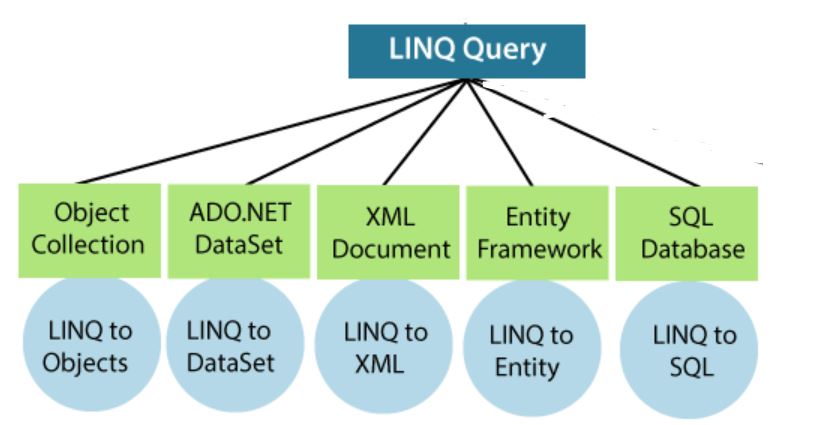`
LINQ Types
In C#, LINQ (Language Integrated Query) has several types or providers, each designed to work with different types of data sources. Here are the main types/providers of LINQ.

Types or Providers of LINQ?
There are several types of LINQ:
- LINQ to Objects
- LINQ to XML
- LINQ to SQL
- LINQ to Entities (Entity Framework)
- LINQ to DataSet
Here are the main types of LINQ in C# explained:
-
LINQ to Objects
- Description - Used to query in-memory collections
like arrays, lists, and other IEnumerable<T> collections.
Exampleint[] numbers = { 1, 2, 3, 4, 5 }; var evenNumbers = from n in numbers where n % 2 == 0 select n; foreach (var num in evenNumbers) { Console.WriteLine(num); // Output: 2, 4 }
- Description - Used to query in-memory collections
like arrays, lists, and other IEnumerable<T> collections.
-
LINQ to SQL
- Description - Used to query SQL Server databases
using .NET objects. It translates LINQ queries to SQL queries.
Exampleusing (DataContext context = new DataContext(connectionString)) { var employees = from e in context.GetTable<Employee>() where e.Department == "Sales" select e; foreach (var employee in employees) { Console.WriteLine(employee.Name); } }
- Description - Used to query SQL Server databases
using .NET objects. It translates LINQ queries to SQL queries.
-
LINQ to XML
- Description - Used to query and manipulate XML
documents.
ExampleXElement xml = XElement.Load("employees.xml"); var employees = from e in xml.Elements("employee") where (string)e.Element("department") == "Sales" select e; foreach (var employee in employees) { Console.WriteLine(employee.Element("name").Value); }
- Description - Used to query and manipulate XML
documents.
-
LINQ to DataSet
- Description - Used to query DataSets, typically
obtained from databases or other data sources.
ExampleDataSet ds = GetDataSet(); // Assume this method returns a populated DataSet var employees = from e in ds.Tables["Employees"].AsEnumerable() where e.Field("Department") == "Sales" select e; foreach (var employee in employees) { Console.WriteLine(employee.Field ("Name")); }
- Description - Used to query DataSets, typically
obtained from databases or other data sources.
-
LINQ to Entities (Entity Framework)
- Description -Used to query databases using the
Entity Framework ORM, providing an abstraction over database tables.
Example
using (var context = new MyDbContext()) { var employees = from e in context.Employees where e.Department == "Sales" select e; foreach (var employee in employees) { Console.WriteLine(employee.Name); } }
- Description -Used to query databases using the
Entity Framework ORM, providing an abstraction over database tables.
Prev Next
